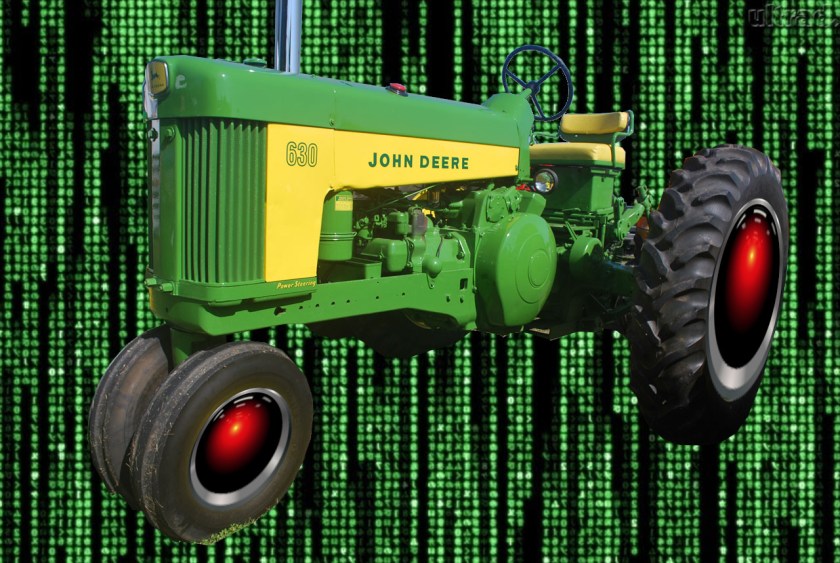
John Deere was once an American icon, beloved by workers for good wages and job security, and by farmers, who co-innovated new agricultural techniques and technologies. Today, it's a case-study in the horrors of finance capitalism. 1/ 

If you'd like an unrolled version of this thread to read or share, here's a link to it on pluralistic.net, my surveillance-free, ad-free, tracker-free blog:
pluralistic.net/2022/02/02/its… 2/
pluralistic.net/2022/02/02/its… 2/
Today, the company is rotten to the core. Despite skyrocketing profits, the company has continued to grind down its workers, sparking a strike by all 10,000 of its workers. 3/
That's just the tangible manifestation of a hollow company plagued by runaway "just in time" manufacturing, and technologically micromanaged workers who are expected to produce on farcically short timetables even as staffing is reduced:
pluralistic.net/2021/10/18/lab… 4/
pluralistic.net/2021/10/18/lab… 4/
The company has also become synonymous with the war on repair. They told the US Copyright Office that the tractors its sells to farmers for six figures are not actually the farmers' property - rather, they are mere licensors of the software that animates those tractors. 5/
So much for "If you're not paying for the product, you're the product." John Deere uses its lock on tractor software to force farmers who fix their own tractors to pay for a service technician to come to their farms and type an unlock code into the tractor's console. 6/
Deere insists this is necessary to maintain the information security of tractors and suggests that if it isn't allowed to extract vast sums from farmers through this scam, their tractors will be hijacked by foreign spies, threatening American food sovereignty. 7/
That would be a lot more credible if the tractors themselves weren't such infosec dumpster-fires:
pluralistic.net/2021/04/23/rep…
All this and more has put Deere on the receiving end of multiple antitrust suits:
techdirt.com/articles/20210… 8/
pluralistic.net/2021/04/23/rep…
All this and more has put Deere on the receiving end of multiple antitrust suits:
techdirt.com/articles/20210… 8/
The idea that farmers should be able to fix their own stuff is a total no-brainer. 9/
There's a reason every farm has had a forge since Roman times: when you're at the end of a lonely road and the storm is coming, you need to get the crops in, and you can't wait for a service call. 10/
Unsurprisingly, there is broad bipartisan support for agricultural #RightToRepair. Nevertheless, previous attempts to pass agricultural R2R laws have been scuttled after the farmers' own lobbyists switched sides and sold out to Deere.
wired.com/story/john-dee… 11/
wired.com/story/john-dee… 11/
Now, there's new federal agricultural Right to Repair bill, courtesy of Montana @SenatorTester, which will require Big Ag to supply manuals, spare parts and software access codes:
s3.documentcloud.org/documents/2119… 12/
s3.documentcloud.org/documents/2119… 12/
The legislation is very similar to the Massachusetts automotive Right to Repair ballot initiative that passed with a huge margin in 2020:
pluralistic.net/2020/09/03/rip… 13/
pluralistic.net/2020/09/03/rip… 13/
Both initiatives try to break the otherwise indomitable coalition of anti-repair companies, led by Apple, which destroyed dozens of R2R initiatives at the state level in 2018:
pluralistic.net/2021/02/02/eut… 14/
pluralistic.net/2021/02/02/eut… 14/
It's a bet that there is more solidarity among tinkerers, fixers, makers and users of gadgets than there is among the different industries who depend on repair price-gouging. 15/
That is, it's a bet that drivers will back farmers' right to repair and vice-versa, but that Big Car won't defend Big Ag.
The opposing side in the repair wars is on the ropes. Their position is getting harder and harder to maintain with a straight face. 16/
The opposing side in the repair wars is on the ropes. Their position is getting harder and harder to maintain with a straight face. 16/
It helps that the Biden administration is incredibly hostile to that position:
pluralistic.net/2021/07/07/ins… 17/
pluralistic.net/2021/07/07/ins… 17/
It's no coincidence that this legislation dropped the same week as @APerzanowski's outstanding book "The Right to Repair" - R2R is an idea whose time has come to pass.
pluralistic.net/2022/01/29/pla… 18/
pluralistic.net/2022/01/29/pla… 18/
Image:
Cryteria (modified)
commons.wikimedia.org/wiki/File:HAL9…
CC BY 3.0:
creativecommons.org/licenses/by/3.… 19/
Cryteria (modified)
commons.wikimedia.org/wiki/File:HAL9…
CC BY 3.0:
creativecommons.org/licenses/by/3.… 19/
• • •
Missing some Tweet in this thread? You can try to
force a refresh











